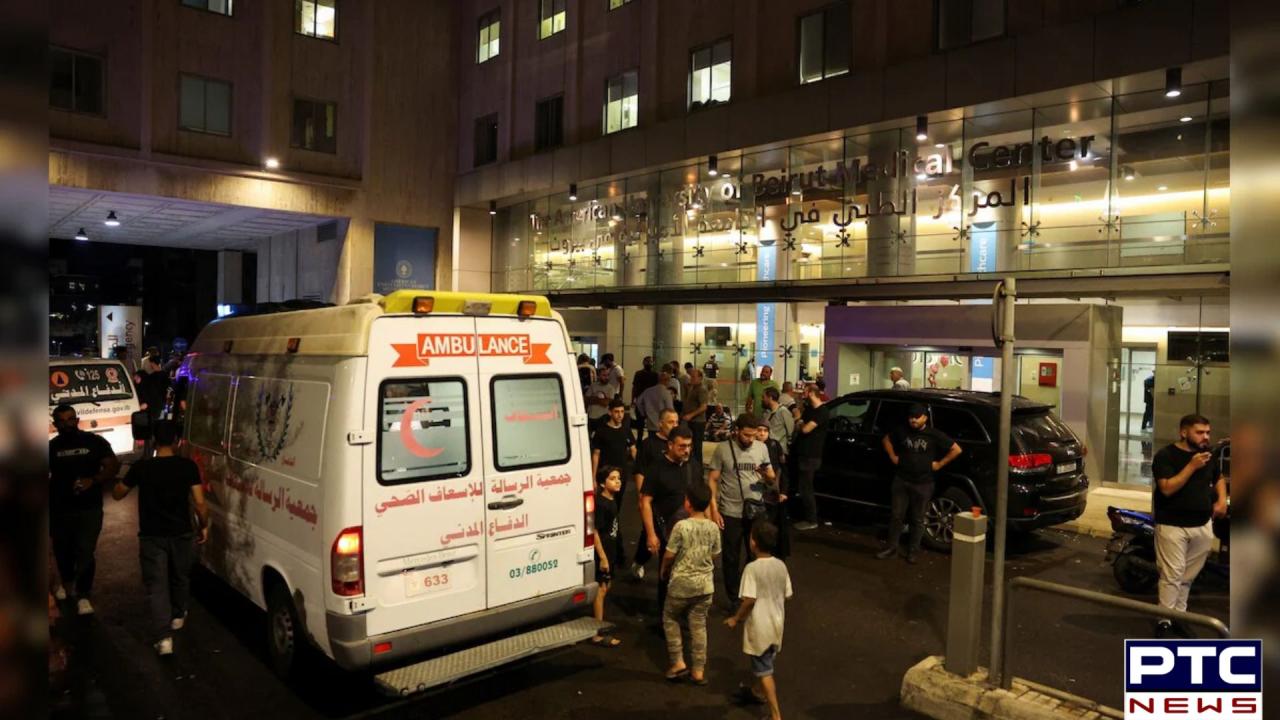

Explosion rocks Hezbollah walkie-talkies in Lebanon, just a day after pager blast incident
PTC News Desk: On Wednesday, hand-held radios used by Hezbollah members detonated in Lebanon's southern region and the capital, Beirut. This incident follows a similar explosion that occurred just a day earlier.
According to Reuters, one of the recent explosions occurred near a funeral organized by Hezbollah for victims of the previous day's pager explosions. The blasts on Tuesday involved pagers used by Hezbollah members, leading to the tragic death of at least nine individuals and injuring approximately 2,750 others.
The pager explosions are part of a series of security breaches affecting Hezbollah's communications. The group, backed by Iran, had previously instructed its members to avoid using mobile phones and instead rely on their own telecommunications system to mitigate potential Israeli surveillance.
However, Lebanese internal security forces reported that a number of these communication devices were detonated across Lebanon, with a significant number of incidents occurring in Beirut's southern suburbs, a known Hezbollah stronghold.
Hezbollah had previously advised its members to steer clear of mobile phones following the onset of the Gaza conflict, urging them to rely solely on their internal telecommunications network to avoid Israeli surveillance. However, Lebanese internal security forces have reported that several wireless communication devices, including hand-held radios recently acquired by Hezbollah, were detonated across the country. The majority of these incidents occurred in Beirut's southern suburbs, a stronghold of the militant group.
Also Read: Ricky Ponting named head coach of Punjab Kings for IPL 2025
Hezbollah's leadership has claimed that these explosions are the result of an "Israeli breach" of their communications systems. The hand-held radios, which were purchased about five months ago—concurrent with the acquisition of the pagers involved in Tuesday's explosions—were reportedly compromised.
According to senior Lebanese security sources and information obtained by Reuters, Israel's spy agency, Mossad, had reportedly planted explosives inside the pagers imported by Hezbollah well before the recent detonations. This sophisticated operation is consistent with Mossad's history of complex operations abroad.
The death toll from Tuesday's attack has risen to 12, including two children, as confirmed by Lebanese Health Minister Firass Abiad. The explosion injured nearly 3,000 individuals, including many of Hezbollah's fighters and Iran's envoy to Beirut. The attack has also drawn attention to the potential for escalating conflict between Hezbollah and Israel.
A Taiwanese company, Gold Apollo, has denied any involvement in the manufacture of the explosive pagers, stating that the devices were produced under license by a company called BAC, based in Budapest, Hungary.
There has been no immediate confirmation of Hezbollah's latest rocket attacks, but typically, the group announces such strikes soon after they occur. It is speculated that Hezbollah may have targeted Israeli artillery positions on Wednesday.
Also Read: Trudeau faces political turmoil as by-election defeat sparks potential no-confidence vote
Hezbollah has vowed to retaliate against Israel, though the Israeli military has not yet commented on the explosions. The ongoing cross-border clashes between the two sides have heightened concerns of a broader Middle Eastern conflict involving the United States and Iran.
Jordan's Foreign Minister Ayman Safadi has accused Israel of pushing the Middle East towards regional war through dangerous escalations on multiple fronts. Mohanad Hage Ali from the Carnegie Middle East Center noted that while Hezbollah aims to avoid a full-scale war, the severe impact of these attacks on civilians could pressure the group to respond more aggressively.
In response to the attacks, Hezbollah has reaffirmed its support for Hamas in Gaza and has warned Israel to prepare for repercussions for the "massacre" caused by the pager explosions. One Hezbollah official described the incident as the group's "biggest security breach" in its history.
Footage from hospitals, as reviewed by Reuters, shows patients with severe injuries, including facial wounds, missing fingers, and large gaping wounds where the pagers were likely carried.
The meticulously planned plot appears to have been in preparation for several months, coming in the wake of a series of targeted assassinations of Hezbollah and Hamas leaders, which are attributed to Israeli operations since the Gaza conflict began.
Also Read: Kerala confirms second Mpox case in India, patient returned from UAE
- With inputs from agencies
